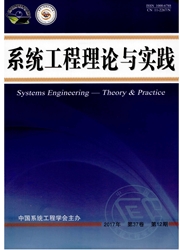

 中文摘要:
中文摘要:
针对上下游企业均发生资金约束的供应链,考虑了两种由交易信用与银行融资组合的融资策略,建立了包含供应商、零售商以及银行在内的动态博弈模型,分别给出了两种组合策略下的最优批发价,订货量以及贷款利率,进一步从供应链成员企业和银行的角度比较了这两种组合融资策略·最后通过数值算例分析了零售商的资金水平对供应链融资系统绩效的影响.研究发现:对于双边资金约束的供应链而言,延期付款与银行融资的组合策略为均衡融资策略;当供应链极度缺乏资金时,对于零售商和银行而言,提前付款与银行融资的组合策略为均衡融资策略,对于供应商而言,延期付款与银行融资的组合策略为均衡融资策略.
 英文摘要:
英文摘要:
For a supply chain where the upstream and tile downstream firms were both capital-constrained, two portfolio strategies of trade credit and bank financing were investigated. A dynamic game model consisting of a supplier, a retailer and a bank was built, and then the optimal wholesale prices, the order quantities and the financing interest rates under the two portfolio strategies were provided, respectively. Furthermore, the two financing portfolio strategies were compared from the perspective of the supply chain partners and the bank. Finally, a set of numerical examples were used to examine the impact of the retailer's capital level on the performances of the supply chain financing system. The study shows that the portfolio of deferred payment and bank financing is the equilibrium financing strategy for the bilaterally capital- constrained supply chain; moreover, when the supply chain face hard capital constraints, the portfolio of advance payment and bank financing is the equilibrium financing strategy for the retailer and the bank, and the portfolio of deferred payment and bank financing is the equilibrium financing strategy for the supplier.
 同期刊论文项目
同期刊论文项目
 同项目期刊论文
同项目期刊论文
 期刊信息
期刊信息
